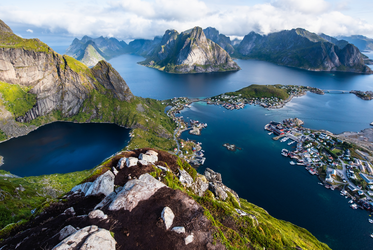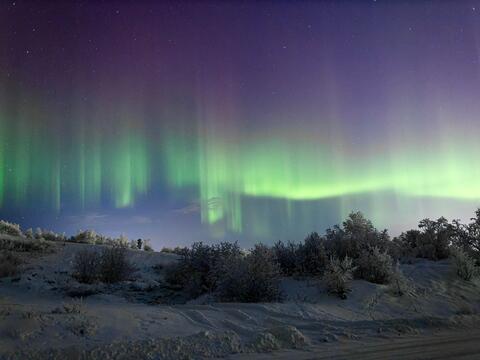
A chat with Tom Kerss
Ahead of our two new dates for astronomy and Northern Lights cruises in 2026, which he will be joining, Tom sat down with us to talk about his life, career so far and what he's looking forward to on the cruise along Norway's coast.
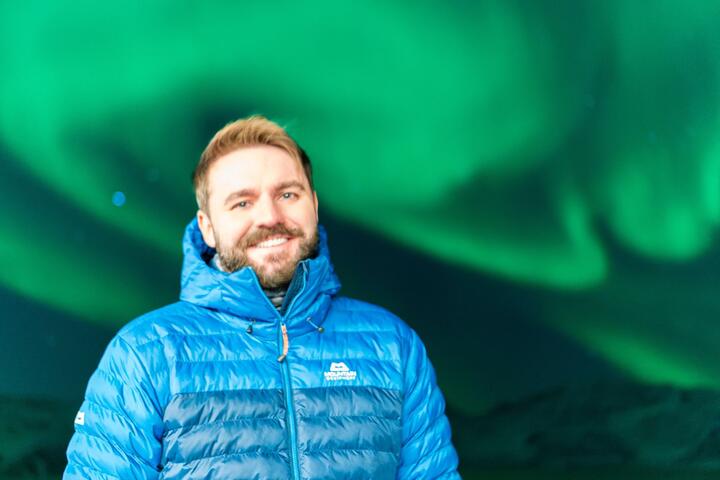
Can you remember the first time you saw the Northern Lights?
My earliest memories are hard to pin down, but growing up on the north coast of Scotland in the early 90s (when I was about five or six years old) we could see a hint of the Arctic's unique nightlife far away over the horizon.
Much later as an adult in my 20s, I began taking people to the Arctic to see the Lights and started to build my own record of memorable sightings. However, I credit that early interest in the sky with leading me to where I am now.
Please tell us a few highlights of your career as an astronomer and aurora chaser
I've had the opportunity to travel the world, experiencing the most extraordinary sights in pristine skies. I've slept under the stars in the Chilean desert, witnessed spectacular total solar eclipses on multiple continents, watched Venus cross the face of the Sun from a volcano above the clouds in Hawaii, and hiked the Arctic wilderness under geomagnetic storms.
Along the way, I've written numerous bestselling astronomy books and previously worked at the prestigious Royal Observatory in London. Over the years, however, the true highlights have been the people I met along the way. Seeing the sky transform their lives gives me purpose. I've watched people break down in tears and even change their careers after being moved by natural wonders they'd previously thought only existed as pictures in books.
And what about some of the most challenging moments of your career?
There's an old saying: never work with children or animals. I would quite happily trade either for working with the weather! All astronomers are ultimately at the mercy of forces that are utterly beyond our control.
In 2015, when a fine solar eclipse was set to grace the UK, the cloud had other ideas. I spent about two hours being interviewed for rolling coverage on a major broadcaster, trying to explain something none of us could see!
Once, while working with rangers in the Namib desert, our truck broke down leaving us stranded with no help for more than 100 miles in either direction. Fortunately, these issues don't affect my aurora-chasing in Norway. The ships and crews are world-class, and being always on the move it's inevitable we reach good weather. In fact, I've never taken a trip up the coast without seeing the Lights.
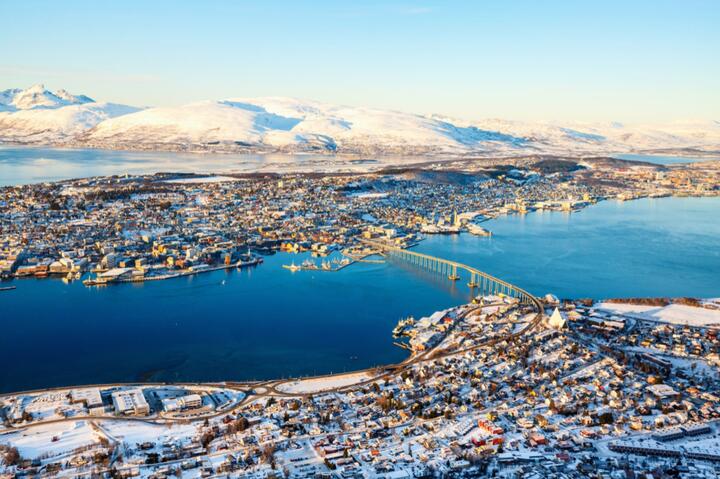
What makes cruising Norway's coast special for you?
The coast of Norway is where the sea meets the sky. It's breathtaking. When we sail north on our floating observatories, it feels like we're making an Arctic expedition of our own, charting a course into the land of the Northern Lights.
Hurtigruten has served the Norwegian coast for well over 100 years, founded at a time when Norwegian scientists (and others visiting for the exceptional conditions) were pioneering aurora research. In many ways, it's the spiritual home of aurora-chasing. If you enjoy being on the water as I do, you'll be treated to the most magnificent coastline in the world.
Is there a particular destination you love visiting; why?
Where to even begin? The coastline is extraordinarily diverse! I will say I'm enamoured with Tromsø. On my first visit, it shot to the top of my favourite cities list. It's not only a beautiful centre of culture and history, it's nestled among some of the most stunning scenery on the coast. To the south lay Lofoten, Versterålen and Senja; to the north the wilderness of Finnmark. I've sussed out the best places to eat and drink, so it always feels like a cosy and familiar pitstop. I can't wait to be there again later this year.
Can you give us a teaser of what you will be talking about on the trip?
My background is in astronomy and science communication, and not only related to the Northern Lights. As such, I love to mix up the topics.
Generally, I devote about half the programme to taking a deep dive into auroras - their history, mystery and science. I also talk about their impact on popular culture and the ways our understanding of auroras is impacting other cutting-edge investigations in astronomy. For those who want to take a deep dive, we do workshops of photography, photo processing and space weather forecasting.
The rest of the programme takes us anywhere! We may discuss the latest findings from the James Webb Space Telescope, explore how we're all related to the Moon, or take a tour of the Arctic's curious constellations. I have a wide catalogue of lectures which I tailor to best suit the interests of the group. Of course, I'm also happy to answer questions any time and we end up exploring all manner of subjects over coffee (or something stronger!)
What do you think are the real highlights of the trip?
I would like to think my stargazers rank me somewhere on their own lists of highlights. I certainly enjoy meeting and sailing with them. Of course, the Northern Lights, with their incomparable appeal, always steal the show. The nights we spend in the Arctic are particularly special.
However, as a seasoned aurora-chaser with hundreds of nights in my logbook, I would like to step off topic and give a shoutout to Hurtigruten's culinary experience. As a half-Dane, I'm whisked back to the nostalgia of childhood by the delicious scandi recipes, and the seafood is on another level. I always tell people I come for the Northern Lights, but I stay for the food.
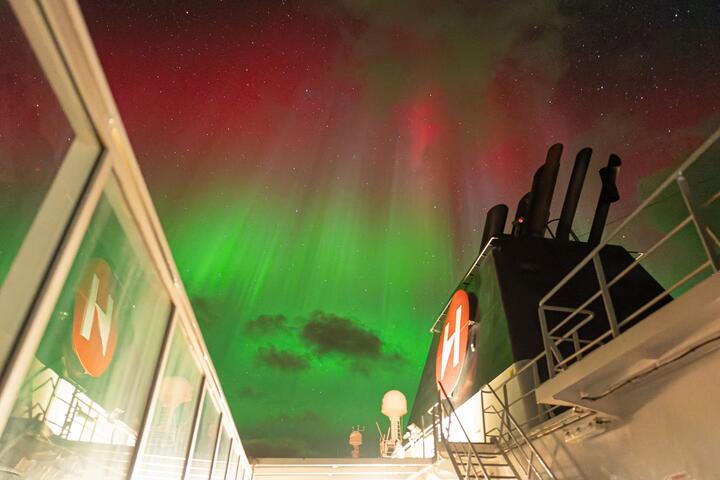
What makes seeing the Northern Lights so special?
There is nothing else on the planet like the Northern Lights. Indeed, there is nothing else in the sky with such unique appeal. Auroras have a creaturely nature, moving as if they possess their own souls. They speak to us in a language we've never learned yet already know.
For some, it's deep scientific curiosity that seizes them; for others it's something spiritual. I always take time to observe other people's reactions, so for me every time seeing the Lights feels like the first time.
The displays you witness will never recur again. They're unique paintings on the sky's canvas that no photo or video can do justice, and they offer a compelling promise: one night you'll have your own personal best experience. You don't know when that will be, you just know you don't want to miss it.
What would you say to someone that's never seen a sighting?
Don't delay! There's a very good reason that seeing the Northern Lights tops almost every bucket list in the world. It's magical. I invite you to forget your expectations and immerse yourself in the whole experience-the bite of the Arctic air, the silent beauty of the sky, the excitement and awe of those beside you. You'll never forget it, and no matter what it takes to get you there, you won't regret it.
Finally, do you have any tips for those wishing to capture the Northern Lights?
You don't need to overthink photography. The chances are you have a capable aurora camera already. Most smartphones made within the last five years are perfectly up to the task. If you're confident with lowlight photography, using DSLR or mirrorless cameras outside and in the cold, there's a whole world of experimentation available to you. But if not, you can be sure that someone around you is capturing a superb photo they'd be willing to share.
The most important advice I can give to budding photographers is to avoid sacrificing your viewing experience by chasing the shot. The photos we take with our cameras can be shared, certainly, but the photos we take in our memories can be felt. They stay with us long after we've moved on in the camera roll.

